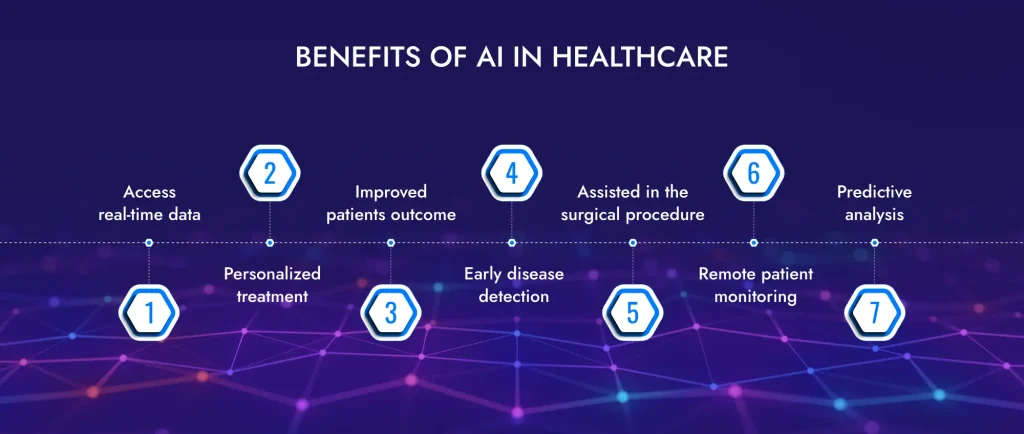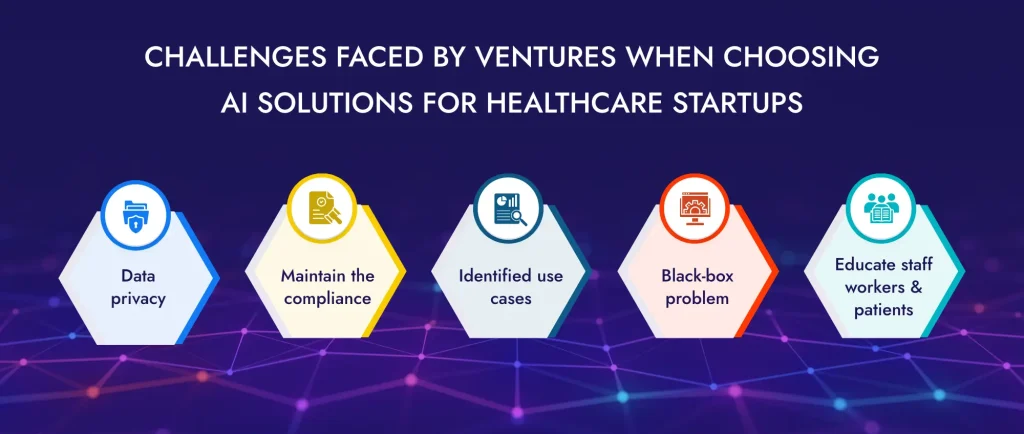ViitorCloud AI solutions have altered healthcare startups, and drive industry innovation. Our AI-driven approach improves diagnosis processes, and personalized treatments, streamlining administrative tasks to improve operational performance, patient health, and satisfaction.
ViitorCloud’s Artificial Intelligence solutions advance accessibility and reduce the cost of providing quality healthcare services. Our predictive analytics predict the early spread of diseases, thus avoiding large-scale effects and saving lives. With the constant evolution in the healthcare industry, our AI expertise reshapes startup ventures that stand at the front line of innovation.
Partnering with ViitorCloud gives a clear implementation of the full benefits of AI in healthcare. Our solutions are designed based on the requirements of the industry: everyday care of patients, pandemics, and unexpected situations. It is time to team up and transform your health business into a difference-maker using advanced AI technology.
Why AI in Healthcare Matters and How Viitorcloud Can Help
In the healthcare industry, the stakes are extremely high – it’s a sector where every decision can impact lives. The integration of AI isn’t just an advancement; it’s a revolution that transforms patient care and operational efficiency. With ViitorCloud’s modern AI solutions, we provide a lifeline to healthcare professionals, assisting them in making crucial decisions and improving patient outcomes.
Our AI technologies assign healthcare workers like nurses, doctors, and support staff by offering accurate diagnostic tools and personalized treatment plans. Imagine having the ability to swiftly diagnose diseases and tailor treatments to individual needs, all while ensuring data is securely tracked for future reference. ViitorCloud’s AI solutions make this a reality, streamlining processes and providing actionable insights.
Furthermore, our AI systems excel in predicting the spread of diseases and analyzing vast amounts of data from various sources, including healthcare records and governmental databases. This capability is invaluable during pandemics or other unpredictable situations, allowing for timely and informed responses.
Read: AI business ideas for Entrepreneurs and Startups
Transform your healthcare startup with AI solutions! Partner with ViitorCloud for cutting-edge AI development services. Let’s innovate together.
Benefits of AI in Healthcare
According to the Statista forecast, the healthcare AI market will reach US $188 billion by 2030. With this number forecast, you can integrate AI in healthcare and get accuracy, customer satisfaction, and other benefits.
Let’s understand in detail the benefits of AI in healthcare:

1. Access Real-Time Data
Real-time data in healthcare provides access to professionals and patient data, which helps them make decisions. The decision-making is related to patients’ treatment and diet plans. Furthermore, real-time data access to the patient helps patients understand their health issues. So they can put effort into improving their overall health.
2. Personalized Treatment
According to diagnosed health issues, AI helps build personalized treatment for patients according to their needs. The needs depend on lifestyle and medical history. Personalized treatment improves patient engagement and satisfies the patients regarding their treatment. For instance, the AI platform Ada Health is useful in patient input and medical repositories to generate health insights and recommendations for treatment for patients on a health journey.
3. Improved Patient Outcome
AI-powered uses predictive analytics and monitoring to identify potential risks in healthcare and prevent the risk in healthcare. For instance, the predictive models of AI and ML detect patient drug reactions. As a result, healthcare providers can take preventive measures and treat patients accordingly.
4. Early Disease Detection
AI has transformed the healthcare industry through early disease detection. Early disease detection is possible by analyzing datasets such as biomarker levels, genetic profiles, and clinical symptoms. For instance, AI-powered tools efficiently detect diseases such as cancer or neurodegenerative diseases. One of the benefits of AI in healthcare is that it prevents diseases from spreading among patients.
5. Assisted in the Surgical Procedure
One of the benefits of AI in healthcare is that it assists in surgical procedures for the patient’s safety. These surgical procedures are achieved by integrating machine learning algorithms and computational intelligence. Additionally, it helps surgeons with laser-sharp accuracy and efficiency. For instance, AI uses surgical robots to assist in surgical procedures.
6. Remote Patient Monitoring
AI is using RPM solutions to supercharge wearable devices and IoT sensors to collect patients’ real-time health data. As a result, healthcare providers constantly monitor patients’ difficult signs, activity levels, and symptoms. Machine learning algorithms analyze the data to detect deviations in health and prevent health risks. For instance, the RMP solution detects heart problems and blood pressure to prevent heart attacks and other fearful diseases.
7. Predictive Analysis
AI benefits healthcare by analyzing large amounts of healthcare data, including medical history, patient demographics, and environmental factors. Also, predictive models help accurately predict disease onset or progression. For instance, predictive models efficiently determine chronic diseases such as cardiovascular ailments or diabetes with lifestyle changes or early prediction.
Also Read: Artificial Intelligence in Healthcare: How AI Is Utilized in the Healthcare Industry
Unlock the potential of AI in healthcare. Accelerate your startup’s success with customized AI solutions from ViitorCloud.
Challenges Faced by Ventures When Choosing AI Solutions for Healthcare Startups
Healthcare organizations use AI in nursing assistance, disease diagnosis, disease treatment, robotic surgery, and precision medicine. According to one KPMG survey, 53% of executives believe AI adoption helps in the leading healthcare industry. However, to implement AI without issues, challenges need to be solved.
Let’s understand in detail the challenges ventures face when choosing AI solutions for healthcare startups.

Data privacy is one of the biggest challenges in AI for Healthcare Startups. Protecting the data from misuse, theft, and malware issues is important in the healthcare industry as it is sensitive personal data. The data includes medical records, DNA samples, fingerprints, and health-related data.
Moreover, AI is useful here as it detects unusual access patterns, which prevents data breaches. Furthermore, an AI technique ensures data protection during storage and transmission. Additionally, the operating system and software must be constantly updated to minimize cyberattacks. Zero trust should be implemented in the system. As a result, AI makes data privacy successful.
The data of every patient is important for healthcare organizations. When patients refuse to give their data, it is difficult for organizations to build data with AI systems. As a result, healthcare organizations and the government create compliance, which builds patient trust to give the data. For example, the Healthcare Information Portability and Accountability Act was passed to maintain standards and keep patients’ data confidential.
This regulation helps build trust among patients so they can share the data freely without any stress. Additionally, the integration of AI and blockchain secures the transmission and storage of patient data to improve privacy and security. It is one of the biggest challenges in AI for Healthcare Startups.
In other industries, machine needs are less, but in the healthcare industry, the use of machines is highest for diagnosing health problems and giving treatment. For instance, various tools, like ventilators, scanners, ECG machines, and X-ray machines, are useful for diagnosing health issues and treating patients.
It is difficult for healthcare companies to identify the appropriate use case for IoT. As a result, healthcare people need to understand different machines to determine the use case. Additionally, they need to consult with vendors about how quickly and simply an AI solution can be integrated into the machine. The vendors can be selected based on generic or vertical solutions, cost-effectiveness, and healthcare business objectives.
AI technology provides results based on input data, making understanding how algorithms work difficult. In some cases, the diagnosis of diseases needs to be corrected, making accountability difficult for the healthcare industry. This type of challenge is known as a black box.
This problem can be solved by using explainable AI. The explainable AI helps in understanding the output of the AI systems by bringing transparency. The transparency took place with a post-hoc method, which consists of four components such as targets, drivers, namely, estimators, and explainable family.
Educating staff about AI systems and their capabilities bridges the skill gap in healthcare organizations. Hospitals and individual experts can conduct training sessions to train staff on AI systems. After giving information to staff, patients must know about the treatment of AI systems.
When patients have information, they can trust AI treatment. For example, robotic surgery provides benefits to patients, such as minimal scarring, shorter hospital stays, lower blood loss, and reduced pain. Patients will not fear getting robotic surgery when these benefits and information are known to them.
Also See: How to implement AI in your business: 7 easy steps
Empower your startup with AI expertise. Leverage ViitorCloud’s AI solutions to drive innovation in healthcare.
Transform Your Healthcare Business With ViitorCloud’s AI Solutions
Are you ready to overcome healthcare challenges with progressive AI solutions? ViitorCloud is here to transform your healthcare operations. Our AI-driven innovations can forecast and diagnose diseases, providing personalized treatments that elevate patient care to new heights.
At ViitorCloud, with our AI development services, we integrate advanced AI technology to streamline your operations, reduce costs, and boost revenue growth, all while upgrading the overall patient experience. Our team of professional experts delivers impactful solutions tailored to optimize your healthcare business.
Don’t settle for the ordinary when you can achieve extraordinary results. Partner with ViitorCloud and transform your healthcare startup into a powerhouse of innovation and efficiency. Reach out today and start on your journey toward a smarter, healthier future with ViitorCloud.
Frequently Asked Questions
An example of AI in healthcare is the Google AI model, which analyzes mammogram images to determine breast cancer accurately. As a result, early cancer diagnosis prevents problems in patients and improves patients lives.
The leading companies applying AI to healthcare are Google, GE Healthcare, Siemens Healthineers, Canon Medical Systems, Aidoc, Microsoft, Merative, and Philips.
AI used in healthcare increases speed and accuracy. Also, AI benefits in healthcare for diagnosing health issues with CT scans, X-rays, and MRIs. Additionally, AI helps provide treatment to patients who have been diagnosed with health problems.
AI benefits the healthcare industry by diagnosing diseases in real-time and providing personalized patient treatment. Further, AI will help in surgical procedures, predictive analysis, and remote patient monitoring.

Vishal Patel
Vishal Patel is an experienced Solution Consultant with a proven track record in the information technology and services industry.
